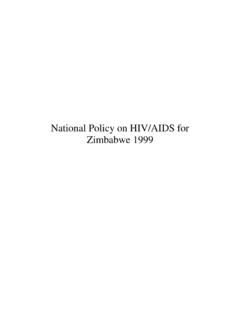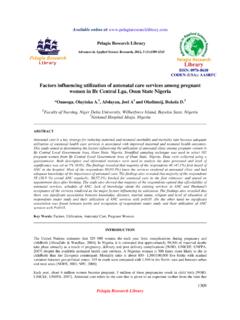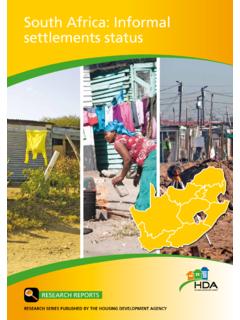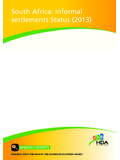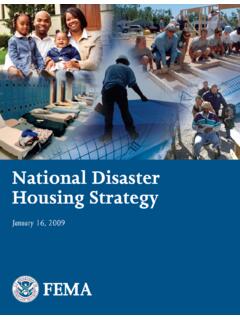Transcription of The Ministry of Gender Equality and Child Welfare ...
1 The National Agenda for Children 2012-2016 was commissioned by the Ministry of Gender Equality and Child Welfare on behalf of the Government of Namibia with support from UNICEF. The Ministry of Gender Equality and Child Welfare recognises the work of Yates Consulting and the team who compiled and laid out this document, and the work of the Technical Working Group for the National Agenda for Children. This document is available from the Ministry of Gender Equality and Child Welfare :Juvenis Building, Independence Avenue, WindhoekPrivate Bag 13359, Windhoek, NamibiaTelephone 061-2833111 Fax 061-229569 / 238941 Email Website digital version of this document is available on the MGECW photographs and graphics in this document are drawn from the archives of the Ministry of Gender Equality and Child Welfare , UNICEF Namibia, the Church Alliance for Orphans (CAFO) and the Gender Research & Advocacy Project of the Legal Assistance Centre (LAC).
2 This document was printed byPrintech cc in s National Agenda for Children 2012-2016 GOVERNMENT OF THE REPUBLIC OF NAMIBIAA cronyms and AbbreviationsAEC Annual Education CensusAIDS Acquired Immunodeficiency SyndromeANC antenatal careARV/ART anti-retroviral / anti-retroviral therapyCDC Constituency Development CommitteeCRC Convention on the Rights of the Child (United Nations)CSO civil society organisationDNEA Directorate of National Examinations and AssessmentDWSSC Directorate of Water Supply and Sanitation CoordinationECD Early Childhood DevelopmentEDF Education Development FundEMIS Education Management Information System (of the MoE)ETSIP Education and Training Sector Improvement Programme (of the MoE)HIS Health Information System (of the MoHSS)HIV Human Immunodeficiency VirusIECD Integrated Early Childhood DevelopmentIMAM Integrated Management of Acute MalnutritionIMCI Integrated Management of Childhood IllnessesIYCF Infant and Young Child FeedingLBW low birth weightMAWF Ministry of Agriculture, Water and ForestryMDGs Millennium Development GoalsM&E monitoring and evaluationMGECW Ministry of Gender Equality and Child WelfareMHAI Ministry of Home Affairs and Immigration MICT Ministry of Information and Communication TechnologyMLSC Ministry of Labour and Social WelfareMoE Ministry of EducationMoHSS Ministry of Health and Social ServicesMoJ Ministry of JusticeMoU Memorandum of UnderstandingMRLGHRD Ministry of Regional and Local Government, Housing and Rural DevelopmentMSS Ministry of Safety and SecurityMYNSSC Ministry of Youth, National Service.
3 Sport and CultureNACS Nutrition Assessment Counselling and Support ProgrammeNAMCOL Namibian College of Open LearningNDHS National Demographic Health SurveyNDP National Development PlanNHIES National Household Income and Expenditure SurveyNIED National Institute for Educational DevelopmentNGO non-governmental organisationNPA National Plan of Action for Orphans and Vulnerable Children 2006-2010 NPC National Planning CommissionNSF National Strategic Framework for HIV and AIDS Response in Namibia 2010/11-2015/16 NSFP National School Feeding ProgrammeNTA National Training AuthorityOPM Office of the Prime MinisterOVC orphans and vulnerable childrenPMTCT prevention of mother-to- Child transmission (of HIV)PTF Permanent Task Force for Orphans and Vulnerable ChildrenRDCC Regional Development Coordinating CommitteeSACMEQ Southern Africa Consortium for Monitoring Educational QualitySDF School Development FundSS Sentinel SurveillanceTBD to be determinedUNAM University of NamibiaUNICEF United Nations Children s FundUSAID United States Agency for International DevelopmentWACPU Woman and Child Protection Unit WASH Water and Sanitation and HygieneWATSAN Water and Sanitation Programme (of UN-HABITAT)WHO World Health OrganisationContentsForeword.
4 IiPreface .. iiISummary of the Agenda .. ivI. Introduction .. 1 Purpose .. 2 Process .. 2 Strategic Focus .. 3 Guiding Principles .. 5 Alignment with National Policies and Planning Tools .. 6II. Commitments .. 9 All children are healthy and well nourished .. 10 All children have equitable access to quality integrated ECD services and pre-primary, primary, secondary and vocational education .. 16 All children have access to age-appropriate quality HIV prevention,treatment, care and support .. 23 All children have an adequate standard of living and a legal identity .. 27 All children are safe from neglect, violence, abuse and exploitation .. 33 III. Coordination, Accountability and Multi-sectoral Implementation .. 40 Coordinating Mechanisms .. 40 Roles and Responsibilities .. 45 Monitoring and Evaluation .. 48 Annex 1: Monitoring and Evaluation Plan.
5 49 Annex 2: Summary Framework .. 55_____Namibia s National Agenda for Children 2012-2016 iForewordArticle 15 of the Constitution of the Republic of Namibia provides for children s rights. These rights include the right from birth to a name and nationality; the right to be protected from economic exploitation; and the right to be protected against forced labour and preventive detention. In addition, Article 20 of the Constitution guarantees that all persons shall have the right to education and that children shall not be allowed to leave school until they have completed their primary education or have attained the age of sixteen .The National Agenda for Children 2012-2016 is a call to action to put the constitutional mandate on the rights of children into implementable strategies. The Agenda is anchored on five pillars: health and nourishment; early childhood development and schooling; HIV prevention, treatment, care and support; adequate standard of living and legal identity; and protection against neglect and pillars of children s rights are cross-cutting to many sectors.
6 This means that the responsibility of the Ministry of Gender Equality and Child Welfare is to serve as the coordinating agent for the implementation of the National Agenda for Children. The Office of the Prime Minister commends and supports the Ministry s efforts. Currently, the Office of the Prime Minister is the convenor of the National Association for the Improvement of Nutrition (NAFIN). NAFIN is a member of the global movement for scaling up nutrition, and aims at scaling up Child nutrition in Namibia. Therefore, in implementing the National Agenda for Children, NAFIN shall contribute to the pillar of am encouraging the Ministry of Gender Equality and Child Welfare to ensure that the proposed High-Level Technical Committee is led by a committed and competent officer in order to put the National Agenda for Children into action. Our children are our future. Ensuring that their rights are realised through the National Agenda for Children will be a major investment in the next generation of citizens and leaders and a secure, stable and prosperous Hon.
7 Nahas Angula, MPPrime Ministerii Namibia s National Agenda for Children 2012-2016 PrefaceNamibia s National Agenda for Children 2012-2016 iiiThe importance of Namibia developing its first-ever National Agenda for Children was highlighted through the publication of Children and Adolescents in Namibia 2010: A Situation Analysis, and through a review of the National Plan of Action for Orphans and Vulnerable Children (2006-2010). Two critical issues were identified through these processes: that Namibia needed to adopt a multi-sectoral approach to planning and implementation towards Child -centred development, and that we needed to look more broadly at the concepts of vulnerability and inequity through the lens of a Child s life a broad-based consultative process which involved government, NGOs, civil society organisations, children and development partners, the national commitments for children were identified, discussed and prioritised.
8 While these five-year commitments have been integrated into current sector policies and plans to a large extent, the National Agenda for Children brings them together concisely, which will enable all stakeholders to plan, implement and monitor their actions for children in a coordinated manner. The Agenda also serves as a major contribution to overall national development planning processes. While the Ministry of Gender Equality and Child Welfare has been assigned the task of facilitating the development of the National Agenda for Children, the primary responsibility for ensuring that is is implemented lies with the line ministries and their partners. We express our appreciation to all those in government and civil society who contributed to the development of the National Agenda for Children, and to UNICEF for its technical and financial support for its development. The Government of Namibia and its partners are committed to the country s future our children.
9 The realisation of the rights of our children to survival, development and protection through the National Agenda for Children will be a significant contribution to our achievement of Vision 2030 and an equitable society in which children are free from poverty and discrimination, and are able to fully contribute to the continued development of a prosperous Doreen Sioka, MPMinister of Gender Equality and Child Welfareiv Namibia s National Agenda for Children 2012-2016 Summary of the AgendaThe National Agenda for Children is organised around five priority commitments and fifteen key results. children are healthy and well All children under 5 years of age have access to adequate nutrition, growth monitoring and health Neonatal mortality is decreased and Child survival is All children in schools and childcare facilities have access to clean water and adequate children have equitable access to quality integrated ECD services, and pre-primary, primary, secondary and vocational education All children access quality integrated early childhood development (ECD) services and pre-primary All children access quality primary All children access quality secondary education and vocational children have access to age-appropriate quality HIV prevention, treatment, care and support Fewer young people are HIV positive.
10 Fewer infants are infected with HIV as the rate of mother-to- Child transmission is Children with HIV receive comprehensive treatment, care and children have an adequate standard of living and a legal identity Child vulnerability is addressed through a comprehensive national social protection system. Vulnerable children have improved access to social All children are registered at birth, and have access to deceased parents death certificates if required. children are safe from neglect, violence, abuse and Children benefit from an enabling legislative and policy Children benefit from integrated protection Teenage pregnancies are reduced and support services are in I ~ Introduction 1 The National Agenda for Children is a five-year framework (2012-2016) devised to guide all sectors in Namibia towards fulfilling their obligation to ensure that all the rights of children are met.


